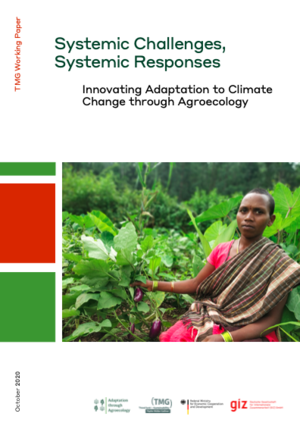Over the course of several months, a broad range of experts, policy makers and practitioners held a series of consultations to explore the contribution of agroecology to innovative and transformative climate change adaptation responses.
- This paper is the culmination of this process, which not only sought to develop a common understanding of the role of agroecology to climate change adaptation, but to craft a common language that can help bring together the agriculture and climate change communities.
- It highlights the potential of agroecological practices to increase resilience and explore different approaches to address climate change vulnerabilities through the lens of food system transformation. As such, it supports the work of the Global Commission on Adaptation and its action track on food security and rural livelihoods.
The consultative process identified the following five key messages:
- To be innovative, adaptation efforts must respond to the systemic challenges posed by climate change to our food systems.
- Diverse agricultural systems are less vulnerable to extreme climatic events, climate variability, and cumulative agro-climatic changes.
- To strengthen the adaptive capacity of rural livelihoods, it is necessary to pair technological innovations, and improvements in agricultural practices, with investments in social capital, the co-creation of knowledge with farmers, new marketing networks, and the responsible governance of land and natural resources.
- Integrated measurement approaches, such as true cost accounting, are necessary to capture all the factors that contribute to climate-resilient food systems.
- Innovating adaptation to climate change calls for nothing less than transforming our food systems.
The consultation series was organized by TMG Research, together with the German Agency for International Cooperation (GIZ), in support of the German Federal Ministry for Economic Cooperation and Development’s efforts to increase the focus on the importance of agroecology to address climate change adaptation needs and food security.
"Adaptation strategies have to go beyond technological solutions and foster social innovation, gender equality, and strengthened communities." Alexander Müller, Managing Director, TMG Research
Through its call for a large-scale, international mobilisation to strengthen the resilience of small-scale farmers to climate change, the Global Commission for Adaptation Action Track on Food Security and Rural Livelihoods offers a timely opportunity to “road test” these messages.




No comments:
Post a Comment